- Home
- Roberto Calas
The Scourge (Kindle Serial)
The Scourge (Kindle Serial) Read online
The characters and events portrayed in this book are fictitious. Any similarity to real persons, living or dead, is coincidental and not intended by the author.
Text copyright © 2013 Roberto Calas
Originally released as a Kindle Serial, November 2012.
All rights reserved.
No part of this book may be reproduced, or stored in a retrieval system, or transmitted in any form or by any means, electronic, mechanical, photocopying, recording, or otherwise, without express written permission of the publisher.
Published by 47North
P.O. Box 400818
Las Vegas, NV 89140
ISBN: 9781611091632
Table of Contents
Episode 1
Map for Episode 1
Chapter 1
Chapter 2
Chapter 3
Chapter 4
Chapter 5
Chapter 6
Chapter 7
Episode 1: Historical Note
Episode 2
Map for Episode 2
Chapter 8
Chapter 9
Chapter 10
Chapter 11
Chapter 12
Chapter 13
Episode 2: Historical Note
Episode 3
Map for Episode 3
Chapter 14
Chapter 15
Chapter 16
Chapter 17
Chapter 18
Episode 3: Historical Note
Episode 4
Map for Episode 4
Chapter 19
Chapter 20
Chapter 21
Chapter 22
Episode 4: Historical Note
Episode 5
Map for Episode 5
Chapter 23
Chapter 24
Chapter 25
Chapter 26
Episode 5: Historical Note
Episode 6
Chapter 27
Chapter 28
Chapter 29
Chapter 30
Episode 6: Historical Note
Episode 7
Map for Episode 7
Chapter 31
Chapter 32
Chapter 33
Chapter 34
Chapter 35
Chapter 36
Episode 7: Historical Note
Episode 8
Map for Episode 8
Chapter 37
Chapter 38
Chapter 39
Chapter 40
Chapter 41
Chapter 42
Episode 8: Historical Note
Acknowledgments
About the Author
Episode 1
Chapter 1
At first, the priests and bishops called it a scourge from God. They preached that only the impure needed to fear it. That the holy hand of the Father was purging the wicked from the earth. But the holy hand of the Father started purging priests and bishops too. They call it a plague now.
I have never seen plague bring a man back from the dead. I have never heard of a plague that keeps a man alive after he has been cut in half. Nor do I know of any sickness, in England or upon the Continent, that gives its victims a taste for living flesh. But I am a simple knight. If the archbishop of Canterbury tells me it is a plague, then I shall do all I can to ease the suffering of those afflicted.
Four women with this plague lurch toward us. There is no white to their eyes, only black. Blood stains their clothing. The closest, a lady dressed in the finery of a gentlewoman, snarls like a starving wolf. I recognize her. She is wife to John Broke, steward to John of Gaunt. I have no love for John Broke, but no one deserves the fate that she has suffered. Blood covers her mouth, neck, and chest. The four women look like demons risen from hell, but I know they cannot be, because Archbishop Hartley says it is a plague. I draw thirty-six inches of medicine from the sheath at my side. The two knights beside me do the same. We line up shoulder to shoulder, shields high.
Be healed, sisters. Be healed.
We tie ropes to the bodies and drag the women to the base of the hill. Sir Tristan returns with bundles of straw. He wears only mail and a breastplate. The rest of his armor dangles from his horse’s saddle like a peddler’s pots and pans. He dumps the straw onto the bodies, and Sir Morgan adds logs and branches. The green wood screams and pops as the women’s bodies burn. We kneel and pray beside the fire. I have been told that demons smell of brimstone when they burn, so I sniff at the pyre. I smell only dead, burning women and the smoke of beech wood.
“What is it?” Sir Morgan asks.
“They aren’t demons,” I reply.
“Of course they aren’t.” Sir Morgan scowls. “They are afflicted by plague.”
“So it is said.”
Sir Morgan stares into the fire. Bits of straw are caught in his red beard. “At least they are in heaven now.”
Sir Tristan stares upward, where the ashes of the four women dance on the wind. “They’re in the sky,” he says. “That’s as close to heaven as they’ll get.”
“Don’t start, Tristan.” I set my gaze on him and leave it there.
“You are a heathen, Tristan,” Sir Morgan says. “And the flames that burn you will be far hotter than these.”
“Yes.” Tristan stands and brushes the straw from his legs. “Because they’ll use more wood in my pyre. We should ride again, Sir Edward. We don’t want to get caught in the open when night falls.”
“We’ll ride soon enough, Tristan,” I say. “Morgan, how much — ”
“For filth’s sake!” Sir Tristan calls out. “It’s back again.”
We run to the horses for our helmets. I grab my great helm by the unicorn crest and slip it over my head. The five of us stare upward at the circling shape. Sir Morgan sighs loudly in his bascinet helm. The falcon flies erratically toward us. It dips and banks, climbs and plummets, seemingly at random. Then it swoops.
We hold up our shields and duck low as the bird shrieks. Sir Tristan laughs as it flutters against Sir Morgan’s shield. Its eyes are completely black and rimmed with bright red. I could kill it from where I stand, but I don’t. Sir Morgan taps it with his shield, and it flutters back into the sky, screeching roughly. The sound is like no falcon call I have heard. As if instead of breathing out, it is inhaling its cry. It flies through the blue smoke of the burning women and struggles back into the sky and away.
“He looked better,” Morgan says. “Didn’t you think he looked better, Edward?”
I don’t reply. The bishops and priests say it is a plague, so I act as if it is a plague. But Morgan, he believes the bishops and priests. He believes it is a plague. And he has faith that his favorite falcon may someday recover.
Chapter 2
“We can still make St. Edmund’s Bury by Tuesday,” I say. I slow my chestnut to a walk so that the other two knights can catch up. We ride side by side as we talk. “We’ll stop in Meddestane just long enough to water the horses.”
“We can’t ride at dusk, Ed. We can ask entrance at Leeds Castle. Shelter there for the night.” Sir Tristan’s horse clips mine as we ride. Tristan and I fought together in France under Robert Knolles. He knows me well.
“We will stay on roads at dusk and stop only when it gets full dark,” I say. “We can make Rochester tonight. Nice castle there too.”
“Ed, we can’t ride at dusk.” Sir Tristan meets my gaze. “If she’s in the abbey, she’ll be safe. A few hours won’t make a difference to her. Our dying out here will.”
I nod to appease him, but he knows I won’t change my mind.
A hundred heads bob on the River Medway. We ride closer to get a better look. The heads are still attached to bodies. There are people standing neck d
eep in the river. We exchange looks. Tristan laughs, and I spur my gelding down to the riverbank. The heads pivot in the water as the people look at us.
“Are you plagued?” I call.
One of the heads has long silver hair and a pox-scarred face. An older male. He calls back to me: “We are all plagued. You and I and everyone. We are plagued by sin. We are plagued by wickedness. Our Lord God is angry, and he is casting us from our homes as he cast Adam and Eve from the Garden.”
“I am Sir Edward Dallingridge of Bodiam. This is Sir Tristan of Rye and Sir Morgan of Hastings. Who might you be?”
“I am Father John,” the man says. “And these are the virtuous people of Meddestane.”
Sir Tristan calls out, “Father John, what are the virtuous people of Meddestane doing in the Medway?”
“We are repenting, Sir Tristan of Rye. The Day of Judgment comes, so we are repenting our sins.”
“Could you repent somewhere warmer?” Sir Tristan calls.
The priest shouts scripture back at him: “Adam said unto Eve, ‘Go to the River Tigris and take a stone and stand upon it in the water up to your neck in the depth of the river. Let not a word go forth from your mouth, since we are unworthy to ask anything of the Lord, for our lips are unclean from the illicit and forbidden tree. Stand in the water of the river for thirty-seven days. Perhaps the Lord will have mercy on us.’”
Sir Tristan wheels his horse in a circle so that the priest will not see him laugh. I glare at Tristan and call to the priest. “Father John, are you and your flock planning to stay in the river for thirty-seven days?”
“We will stay in the river until God speaks to me,” Father John says. “Until He forgives us and lifts the plague from the land. The others of the village left. They travelled to the south. But the devout followed me unto the path of righteousness.”
Sir Morgan nods slowly. “You are a good man, Father John. The Lord will reward you.”
“Come join us, Sir Morgan of Hastings. Come and be spared.”
“Sir Morgan of Hastings has other responsibilities,” I say. “He can jump in the river when he’s done if that is his wish.”
I saved Sir Morgan’s family estates several years ago by convincing the earl of Arundel to intervene on his behalf in a land dispute. Sir Morgan swore to serve me for the rest of my days. He was once a priest, Morgan, and I know it wracks his soul to disobey the bishops and ride north, but his honor prevents him from saying no. Neither Morgan nor I expected fate to pick him for this journey.
“What responsibility can be greater than the one to our Heavenly Father?” the priest says.
“He swore an oath to help find my wife,” I reply. Sir Morgan looks wistfully into the Medway, and I know the fool wants to strip off his armor and wade in. “He swore an oath.”
Sir Morgan and Sir Tristan were two of more than a dozen knights who swore to travel with me to find my wife. But the archbishop has forbidden me from going. I did not want to damn fourteen men, so fourteen cakes were made, and beans were baked into two of them. I was pleased that Sir Tristan found a bean in his, despite his irreverence.
Sir Morgan nods again and sighs. “When we return from St. Edmund’s Bury I will join you in the river, Father John. I, too, wish to repent.”
“Are you daft?” Sir Tristan clutches at the reins of Sir Morgan’s piebald mare. “You’re going to stand in a river until the dead stop walking?”
“This plague is a sign from God, Sir Tristan. He is warning us. Will you not heed it?”
The priest shouts up to us. “Did you say St. Edmund’s Bury? In East Anglia?”
“Aye,” I shout back. “That’s the one.”
“They say the plague started in East Anglia,” Father John says.
“I’ve also heard it said that the plague started in Yorkshire. And in Scotland. No one knows, Father.”
“No one knows,” Father John says. “That is true. But God has forbidden northward travel. Have you not heard?”
“My wife is in the North,” I say.
“Then she is in God’s hands, Sir Edward. Travel to the North is forbidden.”
Sir Tristan shakes his head. “The archbishop may not want us traveling north, Father John, but nothing will keep Sir Edward from his wife. And nothing will keep us from accompanying him.”
“You would defy — ”
A scream echoes off the banks of the Medway. A man has waded into the river on the far side. He has the plague. His staggering gait is evidence of that. I spot another staggering shape moving toward the river. Then another. A horde of them lurch into view. Ten or twenty of them. More than I’ve ever seen. More screams ring out from the virtuous people of Meddestane.
“Tristan…” I trail off because Sir Tristan is already spanning his crossbow. He puts the nose of it against the toe of his boot and cranks the windlass that draws the cord back. I unsheathe my sword. The people in the river are slogging toward our bank. They stagger through the water, and I can’t tell the plagued from the healthy. Sir Morgan dismounts.
“Get back on your horse, Morgan.”
The dead feast in the narrow river. They catch the old and weak and kill them under the water. The heads of the dying disappear into the river. Sometimes the victims have an instant to cry out before the Medway swallows them.
Sir Tristan fires the crossbow. I don’t know how he can tell friend from foe. Perhaps he can’t. Sir Morgan rushes to the water’s edge and pulls a man from the river. The man runs past without acknowledging the help.
“Morgan, anyone who might need help getting out of the river won’t make it to the bank!”
I spur my horse closer, until the water of the Medway kisses its hooves. The man whom Morgan helped out of the water tries to mount Morgan’s horse. Sir Tristan cuffs him with the butt of his crossbow and the man runs off.
Sir Morgan wades into the river up to his hips and helps Father John out of the water.
Sir Tristan winds his crossbow again. “Morgan, if you fall in and that armor sinks you, I’m not going in after you.” I lean low in my saddle and help a woman from the river. She wears a simple wool cloak that must have felt like chain-mail armor with all that water in it. Her eyes are wide as she takes my hand. I pull her up and behind me into the saddle. She clings to me, shivering and sobbing. There are dozens leaving the river now, and I still have no idea who is prey and who is predator. One of them reaches toward my horse. I have no room for another rider, so I shout at him to keep moving. But he’s not interested in riding. The moonlight shows no whites in his eyes. He opens his mouth and I shove my sword into it, deep into his palate. The abomination gurgles and still reaches toward the horse. He has a cockleshell bracelet on his wrist signifying that he has made the pilgrimage to Santiago de Compostela. I put my boot on his chest and shove him off the sword, then cleave the top of his head when he advances again.
Another one reaches toward my horse on the opposite side. I turn and slash my blade through her throat. Her eyes are wide as she drops to one knee, and I see clearly the whites reflected in the moonlight.
Oh dear God.
The woman fidgets at her throat, as if adjusting a scarf. Blood pours through her fingers. She has light hair, like my Elizabeth, and her eyes look into mine as she dies. The woman behind me screams that I killed Allison Moore, and now I know the name of my sin.
The woman leaps off my horse and stumbles away from me. I let her run. I look at the body of Allison Moore and curse Sir Morgan silently. When I pull back from the water’s edge, Sir Morgan’s piebald is gone. I find it two hundred yards away, galloping into the darkness with a man in its saddle. Sir Morgan doesn’t seem to notice. He is hacking at a plaguer that is tearing flesh from the back of a man’s neck. “He’s gone, Morgan. Get out! Get out! Your fucking horse is gone!”
Sir Tristan backs up the riverbank. The crossbow is gone. His sword is out. “We’re about to get overrun, Ed!”
There are dozens more of the plaguers plodding into the river. And
I’m fairly certain that most of the shapes approaching our bank are not human anymore. I think about buying time for the people of Meddestane, of holding off these monstrosities for a bit, but I know that frightened humans run faster than these things. “Morgan, we are done here!”
Sir Morgan looks at me, and I can see tears shining on his cheeks. He abandons the dead man whose arm he holds, then seems to notice that his piebald is missing. “What?”
“I told you to stay mounted! Get on!” I extend a hand to him, and he pulls himself behind me. I kick at a black-eyed form reaching for my gelding, and we turn and goad the horse up the slope. Its hooves slip and kick up tufts of sod, but we escape the carnage of the river.
Our horses gallop away from the Medway’s banks, and I try not to think of Allison Moore.
Chapter 3
I don’t want to ride at dusk with so many of these horrors lurking so close. I don’t give Tristan the satisfaction of telling him he was right, and he doesn’t broach the subject. I tell the others that we will stop at Aylesford. There is a priory there, and I know it will be well defended against the plague. It’s not Rochester Castle, but it will do.
Two soldiers level crossbows at us outside the compound and make us strip to the skin. They do not seem to care that the three of us are gentlemen. They inspect our bodies for wounds before allowing the gates of the priory to open. We dress and cover our noses against the stench of rotting bodies. There are dozens of them lying in clumps outside the walls.

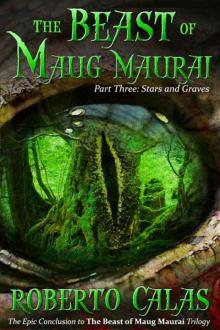 Stars and Graves
Stars and Graves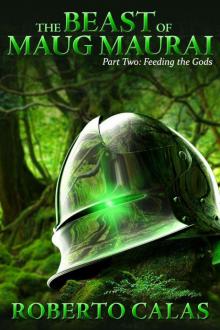 The Beast of Maug Maurai, Part Two: Feeding the Gods
The Beast of Maug Maurai, Part Two: Feeding the Gods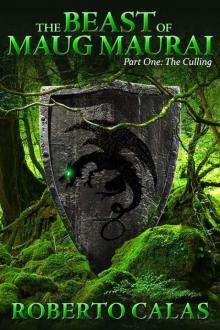 The Beast of Maug Maurai, Part One: The Culling
The Beast of Maug Maurai, Part One: The Culling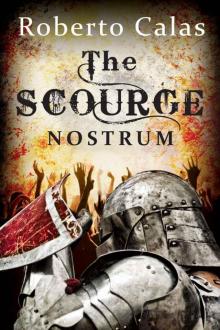 Nostrum (The Scourge, Book 2)
Nostrum (The Scourge, Book 2)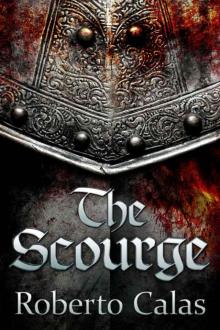 The Scourge (Kindle Serial)
The Scourge (Kindle Serial)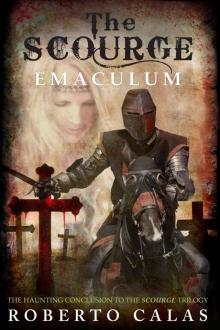 Emaculum (The Scourge Book 3)
Emaculum (The Scourge Book 3)